| Yunnan Visual Forum in Yamagata |
|---|
|
Part 1 Part 2 |
Part 1: Visual Anthropology in Yunnan
Amidst dramatic societal change, the traditional cultures of ethnic minorities in Yunnan are rapidly being lost. Visual records are evermore significant for these people in such social climates.
Ethnographic film has a long history in China. Even before the Cultural Revolution, visual records of minority cultures in China were produced to facilitate national policies. However, since the 1980s, researchers and filmmakers of ethnic minorities have taken the camera into their own hands to record visual interpretations of their traditional cultures. Today, ethnographic documentary production courses at universities are said to be playing a vital role in the minority cultures curricula. What was the nature of the ethnographic documentaries that were created in the pre-Cultural Revolution era? And how have these affected the way in which contemporary filmmakers of ethnic descent visualize their cultures through the lens today?
In Part 1, a sample of pre-Cultural Revolution documentaries of ethnic minorities will be screened along with recent ethnographic films. We will contemplate the role of ethnographic filmmaking as a means of ensuring the survival of traditional culture.
(Muguruma Yumi)
New Initiatives in Visual Anthropology—Films by young ethnographers and filmmakers
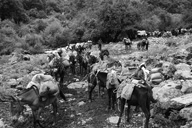 Gebu Sweet Gebu
Gebu Sweet Gebu
- 2005 / Tibetan / Color / Video / 60 min
Director, Photography, Editing, Source: Zeng Qingxin
Camera Assistant: Chen Liu
Supervisors: Feng Jiankun, He Shaoying
Producer: Gong Jian
In cooperation with: Zheng, Villagers of Gebu, Kawagebo Culture Society
Production: Yunnan Nationalities University
The residents of the Tibetan village of Gebu have made their living handling long-distance transportation of goods, using caravans for both work and living. This film explores the caravan’s ages old custom of trade and travel, details the home life of the village, and portrays the hearts of the villagers today.
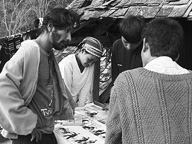 Akha (Hani) New Year: “Gatangpa”
Akha (Hani) New Year: “Gatangpa”
- 2003 / Hani / Color / Video / 20 min
Directors, Photography: Zeng Yiqun, Lu Bin
Sound: Zeng Yiqun, Lu Bin, Mei Lanq (Hani), Wang Jianhua (Hani)
Original animation drawing: Mei Lanq
Animation design: Mei Lanq, Lu Bin
Animation: Lu Bin
Producion, Source: CBIK (Center for Biodiversity and Indigenous Knowledge)
“Gatangpa” is the name of the Hani tribe’s New Year’s festival which has not been held since the Cultural Revolution. Mei Lanq, a young Hani man, uses animation to recreate the Gatangpa festival while incorporating indigenous knowledge acquired through interviews with elder members of the Hani tribe. Through the use of this new approach, the film attempts to impart the significance of the tribe’s lost traditions to the next generation.
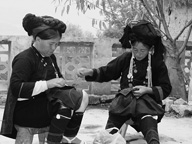 Hani Textile Arts in Jinping
Hani Textile Arts in Jinping
- 2005 / Hani / Color / Video / 29 min
Directors: He Yuan, Wang Jing
Producer: Zheng Baohuo
Production: Yunnan Academy of Social Sciences, Community Development Research Center
Source: He Yuan
The art of Hani embroidery, traditionally passed down through generations of Hani women, is slowly vanishing. The film documents the process of the textile art, while also featuring the Hani women’s thoughts regarding this disappearing art form.
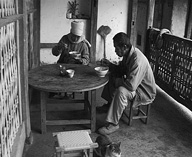 The Son Is Not at Home
The Son Is Not at Home
- 2004 / Dai / Color / Video / 15 min
Director, Source: He Yuan
Dai language translator: Feng Shunqing
In cooperation with: The Volkswagen Foundation, Rockefeller Foundation, Probe Media Foundation
Production: Mang Studio
Mr. Xie lives in Dawan, a typical Dai village in province of Dehong that is part of a drug-smuggling route from Myanmar. In Spring 2002, the authorities sent his son to a drug rehabilitation center in Chuxiong, leaving Mr. Xie and his wife to care for themselves. Although he battles illness, he has no money for hospital treatment. Meanwhile, harvest season approaches, but the sugar cane and corn crops are left untouched in the fields.
Visual Anthropology Forum
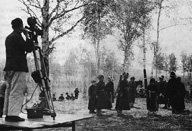 The Kawa (The Wa)
The Kawa (The Wa)
- 1957 / English / B&W / DVD (Original: 35mm) / 25 min
Scientific Advisor: Tan Bibo
Photography: Zheng Zhiguo, Yang Guanghai
Editing: Wang Ronghua
Sound Design: Shi Feng
Production: Chinese Academy of Sciences, Institute of Nationality Studies
Source: IWF Wissen und Medien GmbH
During the pre-Cultural Revolution years of 1957 to 1966, the Institute of Nationality Studies at the Chinese Academy of Sciences produced twenty-one documentary films regarding various ethnic minority groups in China. This film documents the Wa tribe of the Ximeng mountains. It captures scenes of slash-and-burn agriculture, rituals of bull sacrifice, dragging out of wooden drums and headhunting rituals.
Symposium: History and Current State of Visual Anthropology in Yunnan
- Lecturers:
- Guo Jing
Zeng Qingxin
He Yuan
Coordinators:- Taguchi Hiromi
Professor at Tohoku University of Art and Design
Muguruma Yumi
Associate Professor at Tohoku University of Art and Design
 Guo Jing
Guo Jing
Born 1955 in Kunming, Yunnan Province. Ethnic Han. Professor and Director of the BAMA Mountain Culture Research Institute, Yunnan Academy of Social Sciences; Director of YUNFEST; and former Director of the Yunnan Provincial Museum. Guo Jing has organized many international projects dealing with community-based education using video in the mountain regions. Well published, he has directed ethnographic films such as Family of Black Pottery (2002), Glacier (2002), and independently directed and produced A Legend of Kawakarpo (2005).  Zeng Qingxin
Zeng Qingxin
Born 1968 in Shangri-La, Yunnan Province. Ethnic Tibetan. Zeng Qingxin graduated from Yunnan Normal University, and currently teaches at Yunnan Nationalities University. Between September 2001 and July 2003, Zeng studied at Yunnan University’s East Asia Institute of Visual Anthropology (EAIVA).  He Yuan
He Yuan
Born 1975 in Lijiang, Yunnan Province. Ethnic Naxi. At the age of 25, He Yuan completed the Visual Anthropology course at Yunnan University’s East Asia Institute of Visual Anthropology (EAIVA). After graduation, he started to make documentaries and write essays. Researcher at the Yunnan Academy of Social Sciences and on the main staff of YUNFEST, he has directed ethnographic films such as The Son Is Not at Home (2004) and Hani Textile Arts in Jinping (2005), and participated in the production of Jade Green Station (2003) as assistant director, cinematographer and editor. |
